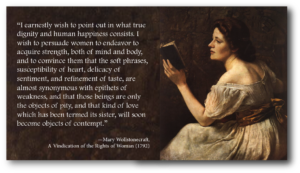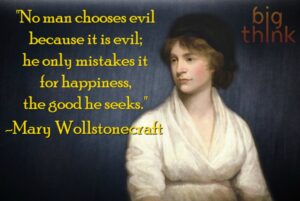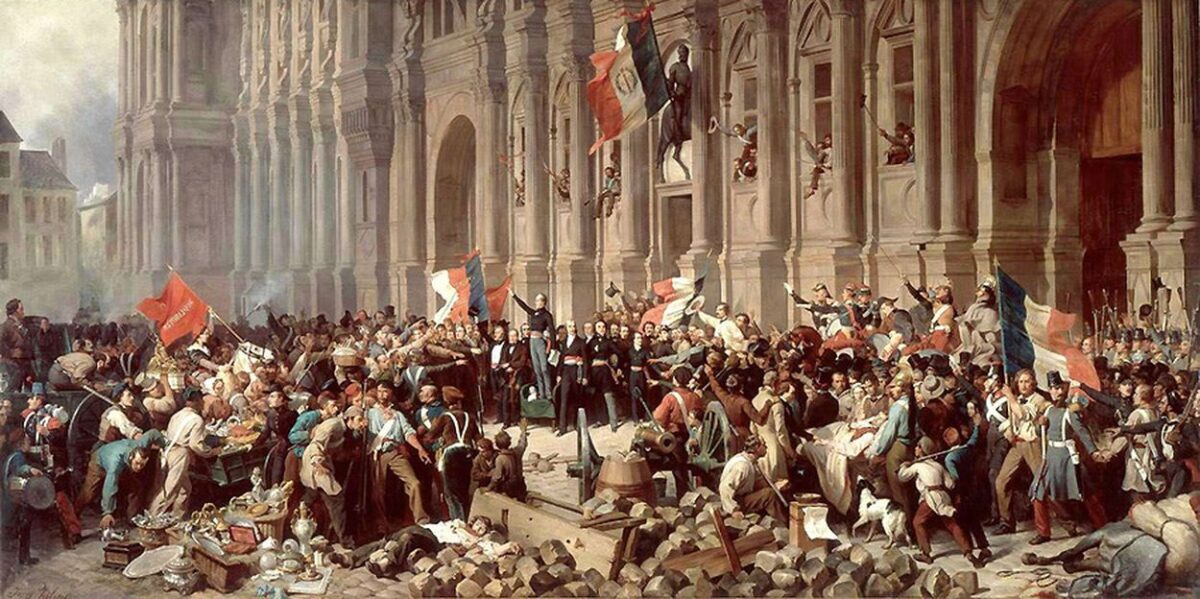
During the eighteenth and nineteenth century, If women were reasoning if there is any way they can live independently or live equally as men, then people in modern society would not have to question or distinguish the male and female from getting equal rights. This is a good thought to ponder as it is elaborates in the discussion we have for both men and women in today’s society and in the past history as people lived by. A Vindication of Rights of Women written by Mary Wollstonecraft. Mary Wollstonecraft is a powerful tolerant writer and she was known for the world’s best feminist author. She struggled all her life mostly living independently. She traveled all around the globe and helped almost all of her friends and families when they sought for help. She developed her intellectual by making the right choices by herself. This is the reason why she wanted women to live independently and be able to use their brain for the right things to show the society what they are capable of. Her works of literature is mostly on the radical ideas that generally discusses the equality and inequality.
The author has argued throughout the reading to emphasize the three main points. First, she gave reasoning to help overcome the prejudice where most men lack it. Second, she mentioned that the people who have the virtue are the ones that are better than who does not have the virtue. She said that because she was attempting to convey to the readers that both men and women have equal virtue. The final point that she stated is that people gained knowledge by the process of overcoming from their emotion and passion. She has interprets these three points in the whole text by giving descriptive and examples of each. Mary stated “Rousseau declares that a woman should never, for a moment, feel herself independent, that she should be governed by fear to exercise her natural cunning, and made a coquettish slave in order to render her a more alluring object of desire, a sweeter companion to man, whenever he chooses to relax himself”. (2.24) This means that Rousseau still believe that women should always obey the men in order to ask for what women want. One can relates this quotation with the first point where she mentioned that most men are lacking the idea of “to help overcome prejudice. Later in the text, Mary has disagreed with Rousseau’s point of view as she thinks that both men and women should live equally. She argues to his thought that women have the same intellectual as men do. She believes that measuring one’s physical strength does not dignify your full strength as a human being. She even argued that body strength is so unnecessary in modern society that people has look down on it. She said one can measure themselves by the virtue of morality and having education which lead them to succeed. To support this thought, she stated “It follows then, I think, that from their infancy women should either be shut up like eastern princes, or educated in such a manner as to be able to think and act for themselves.” (3.30) This interprets as that the purpose of this education is so that people can control their emotion by strengthening their reason, unlike animals.
In the reading called A vindication of Rights of Women by Mary Wollstonecraft, author uses “women and femininity” as the main theme of the text to show the readers how they should treat women and how women’s mind are just capable of reason and virtue as men. An example of this theme as author said ““I do not wish them [women] to have power over men; but over themselves.”(page 5) This shows that the author does not want to reverse the concept of the inequality of men and women, but rather she wants women to have the rights as equal as men do. She also said if women does not get educated, then it will be difficult for their children to grow intellectually. Indeed, men are just afraid to give women their equal rights because men believe that women will try to take over all the power and will reverse the concept of inequality. Also, the tone of the text is that the author loves the word reason as she wrote it with the capital “R”. She also has referred to men as masculine and women as feminist. She was favoring more of women than men because she already knows that men already have enough power to raise their voice but women do not as women fear their emotion. If women are well enough to be educated, then they would not have to be afraid to speak up for their voice. Men would easily know how tough it will be for them to speak to a woman who would bring a reasonable argument with her power of education. Woman’s emotion won’t easily appear there if she shows her level of confidence thorough her knowledge.
A vindication of rights of women can relate to many readings that have shared some common ideas with this text. Wollstonecraft has develop new and radical concepts in the late eighteenth century as it connect to french revolution. Wollstonecraft’s primary concern was women’s education as equal as men do. During the french revolution, women were not having the power to raise their voice to speak for the rights. As a result of that, Wollstonecraft raised her voice and fought for women’s right after getting the independence of “A vindication of rights of men” as it was also written by her. She shared her views on how the revolution in France should include the movement of the political and social structures of women. She also said that if women in general does not receive education and forced to live as a housewives, then how they will properly done that without any knowledge. To prove her point, she said, “It is time to effect a revolution in female manners – time to restore to them their lost dignity – and make them, as a part of the human species, labour by reforming themselves to reform the world. It is time to separate unchangeable morals from local manners.” This is showing that Mary wants to change Another reading that connects to all these ideas that the author convey to the readers is Paradise lost by John Milton. The similarities between these two readings are that both of them discusses about the power between two people or two groups. In paradise lost, Satan was using his power that was granted by god to the people on earth to make them evil like he is, just like the way Mary described in her text about how men were using women as like their slaves. Also, it was similar in the way that Satan and god’s two angels were using two different power to lead people and that take people in two direction that are both good and bad.
Finally, in today’s society, women’s right has changed in a significant way. Women have almost the same power as men do. In fact, they are leading almost everything from the men. Today we see many female that are doctors, engineers, and businessman. In every jobs, we see half males working and half females working and getting equal paychecks. Nowadays, there are also many males that are taking care of children and keeping house in their responsibilities.
Questions:
Are men today still superior to women? If so, In what ways?
What are the advantage that women are getting from this equal right?
In some country, men still have more power than women, what are the thoughts of these people from these countries? If any of them read this text by Wollstonecraft, especially those women who are not getting the equal right as men are getting, will anything change for them from reading this?





